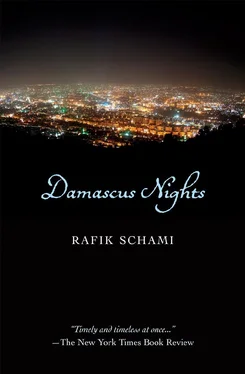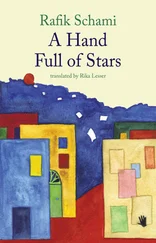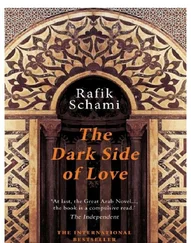"But that's enough babble about me! Now I want to tell you a real story. As God is my witness, I will tell you only what Ahmad told me.
"The prisoners all liked to gamble. You know, it's a good way to kill time, and you can also win a little tea, a few cigarettes, or a piece of bread. But we had this one prisoner who never bet. His name was Ahmad. We would be gambling away like mad, and he would just sit in the corner like a stone. He was dirt poor, and whenever I won something I gave part of it to him. Now, I'm not one to pry, but one day I asked him why he never played along. 'Why don't you ever bet?' I said. Well, you know in the beginning I thought he was a miser, but actually he was very generous. There was this one time I had a run of bad cards and lost everything I had after just a few hands. Bankrupt. So I was sitting down in the corner next to him, and he took off his new shirt and gave it to me, without saying a word. I traded the shirt for three boxes of cigarettes, and then I was able to win back everything I had lost. But he himself never gambled.
"We would bet on anything. Sometimes, if we couldn't find anything better, someone would holler: 'Any bets on whether this fly's going to land on my nose?' and we'd all rush to place our bets. There were tricks, you know, that you could use to influence the fly. If you brush a fly off in a certain way — just a little bit, not too much — it will come back to the same spot as if it owned it."
"I know about those damned rascals! Whenever one takes a fancy to my nose, it always ruins my nap," Musa confirmed with a laugh.
"I can tell you," Isam continued, "that you go into prison with one profession and come out with a thousand and one professions. You can learn anything there. I told you how I learned to read. You can become a baker, a butcher, or a locksmith like Ali here, but that's not all — you also learn how to use a knife, how to counterfeit money, how to smuggle, and how to tell jokes. You want to hear a joke?"
"Let's hear it," said Tuma encouragingly.
"This is a political joke I heard from that poet I was talking about. The only jokes he told were political. Well, this joke goes like this: there are these two assassins hiding right outside the presidential palace. They're waiting for the president to come out, and their fingers are glued to the triggers of their pistols. Well the whole day goes by, but this president never leaves the palace. So the assassins keep waiting. The next day comes and goes, and still no sign of the president. Then the third day comes and the same thing happens. By now the men are pretty upset.
" 'Where the hell can he be?' asks one.
"The other man turns to his companion, full of concern, and says, 'God, I hope nothings happened to him!'
"We used to tell jokes all the time. The guards treated us worse than animals, you know, but we just laughed at them — among ourselves, that is. You want to hear another joke about the guards?"
"No, no, why don't you tell us about this man who didn't want to bet," the minister requested impatiently. He was the only one who hadn't laughed at the joke.
"Right. Let's see. His name was Ahmad. Once I asked him why he never bet. Right, I said that. Oh. So once he told me his story. It was incredible, like many of the prisoners' stories. You know, you hear a lot of stories in prison. Fifty percent you throw overboard, and another thirty percent you're bound to forget. But what's left is still unbelievable. Absolutely unbelievable! There was this Armenian serving a year's sentence. His name was Mehran. A small guy — short, and skinny as a rail. When we asked him what he had been sent up for, all he said was: 'Beat up big bear.' He didn't speak Arabic very well. It took us a month to put together what had happened. Apparently he had this neighbor who was as big and strong as our Ali, and the man used to beat his children every afternoon. Mehran asked him to stop because he — Mehran, that is — wanted to enjoy his afternoon nap, and besides, he couldn't stand children being beaten. So this big bear of a neighbor growls back that from then on not only would he beat his children, but Mehran as well. Then he went after Mehran, but Mehran caught him with his right hand and hurled him several yards. And the bear wound up in the hospital.
"Judges don't understand beans. The neighbor should have gone to prison, not this Armenian. But what am I going on about? You know, they stole so many years of my life… but we don't want to be sad. Now where was I?"
"About the brave Armenian?" said Ali the locksmith.
"About Ahmad! You were going to tell us why he never bet," the minister grumbled.
Isam looked at Faris a little confused. "That's right, about Ahmad, but let me say just one more thing about the Armenian. Like I was saying, Mehran was not very big. When we finally understood what he was saying, we all laughed and figured he was just a pickpocket. Pickpockets aren't exactly respected in prison, you know, so they always try to make up stories to impress the others. But one day we were in the yard when these two thugs decided to pick on him, just like that, for no good reason — I mean, Mehran, he wouldn't even harm a fly. He never started a fight in all his life. But if someone did him wrong, Mehran never forgave him. He could carry a grudge longer than a camel. In any case, there were these two big thugs out in the yard who could eat him for breakfast, so to speak, without a swallow of tea, and they attacked him. Mehran stood his ground, firm as a rock, and then quick as lightning he flipped the first man, just like a pea, right into the second. Those two thugs went limping around for weeks.
"The strange thing was, though, that Mehran didn't want to be the boss of the cell. The strongest man we had was this boy from Horns. When he saw what Mehran had done he told him right then and there he would give up his place by the window. But, you know, Mehran declined. He didn't want to be anybody's boss."
"His mother must have fed him lion's milk for breakfast," commented the barber.
"Armenians are very brave," Junis confirmed. "I knew one named Karabet. He came to my coffeehouse every day. His Arabic was no better than this Mehran's, but each word was like a whole story. One day—" Junis wanted to go on, but by then the minister had lost his patience entirely.
"And Ahmad, what finally happened with your goddamned Ahmad?" he groaned.
"You're right," said Isam. "I really have to get to Ahmad. When Ahmad was young, he was famous for having a keen nose for wagers and a nimble tongue. He made a lot of money off his poor neighbors whom he drew into his bets. He was such a good talker that the president invited him to his parties in order to keep the guests entertained. There wasn't a better joke teller in the whole prison. But that wasn't all his tongue was good for; it was every bit as sharp as a dagger of Damascus steel. Only Abu Nuwas in his day could be as sharp as that — do you know his story about the chickens and the caliph?"
"No, what story is that?" Tuma wanted to know, but now the minister was rolling his eyes.
"Please, I beg you," said Faris emphatically, "for a few piasters you can buy Abu Nuwas's story of the chickens and the caliph in the bookstore. Let's get back to this damned Ahmad, or whoever he was."
"Of course, you're right, I'm sorry. I will now swear by the soul of my mother that I will finish the story of Ahmad. Where was I. Oh. Right. One day the president and his wife hosted a benefit for poor orphans. For weeks the newspapers wrote about the upcoming event; anybody who was anybody was supposed to be there — the richest merchants, the wealthiest farmers, the heads of the most powerful families, writers, actors, and foreign guests were all going to take part.
"The food was out of this world. The tables were piled high with roast gazelle, peacock liver pate, and pistachio rolls, and the guests applauded the dancers, singers, and jugglers. Well, the president started drinking a lot and, you know, whenever the president was drunk it was dangerous to go near him, there was no telling what he might do. I heard once that he had been invited to Malula and—"
Читать дальше












